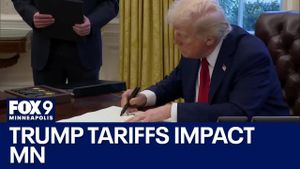Wall Street has faced significant volatility recently, prompting investors to rethink their strategies amid fears of economic turmoil and over-reliance on major technology firms. The week began on a shaky note, largely due to U.S. President Donald Trump’s recent tariff announcements which rattled stock markets and intensified concerns about clustering risks surrounding the so-called Magnificent Seven tech giants.
Major indices struggled amid heightened tensions, with the S&P 500 and Nasdaq 100 feeling the brunt of the impact from both international dynamics and domestic monetary policy concerns. Observers noted the volatility as traders confronted news of economic uncertainties stemming from potential fallout due to trade policies targeting key U.S. partners, such as China, Canada, and Mexico.
On Thursday of the same week, the situation escalated as Trump confirmed tariffs on significant imports, prompting fears of inflationary pressures and potential retaliation from these nations. This move sent ripple effects through financial markets, deepening the sell-off witnessed particularly among technology stocks.
The consequent market turmoil provoked many investors to reflect on their positions, as reliance on these predominant tech stocks—often referred to collectively as the Magnificent Seven—raised concerns about potential vulnerabilities within their portfolios. Analysts have since suggested diversifying investments beyond these mega-cap firms.
According to Ayako Yoshioka, Senior Portfolio Manager at Wealth Enhancement Group, "Diversification across the stock markets is important." Having recognized the increasing risks linked to clustering, her strategy involved adjusting allocations within the S&P 500 to mitigate exposures to concentrated tech bets.
Interestingly, the turmoil revealed opportunities for various investment strategies favored over the past years, particularly quantitative investing approaches and sector-focused Exchange Traded Funds (ETFs). Providers like BlackRock and ProShares have been actively rolling out new products targeting investors seeking to navigate the contemporary market challenges.
Reported shifts indicated growth for value-driven investments as traders sought to capitalize on favorable opportunities outside the tech sector, pivoting focus onto ETFs capable of shifting away from disadvantageous dynamics surrounding tech valuations. This shift has become increasingly pronounced as some newer ETFs demonstrate success by excluding top tech performers altogether, offering investors potentially healthier diversification paths.
Despite the challenges, quantitative strategies emerged as notable winners amid the recent trading environment. Reports suggested the Low-Volatility strategy experienced strong performance, generating nearly 1.5 percent returns—appealing to those cautious about tech-centric investment exposure.
Market observers have noted the so-called Magnificent Seven stocks, which dominate the present investment landscapes, must contend with new entrants attempting to capitalize on the growing desire for diversification. Michael Sapir, CEO of Proshares, emphasized having these strategies prepared is prudent, stating, "The market goes through cycles," pointing to historical precedent where shifts occur and companies must adapt.
The statistics reflect growing momentum surrounding new ETFs, with inflows of capital dedicated to smart-beta strategies rising sharply early this year. This influx demonstrated investor hunger for alternatives and the growing acknowledgment among traders about the risks tied to concentrated positions.
Day by day, anxiety permeates the markets as key indicators suggest the S&P 500 may experience heightened volatility, which has the potential to reshape traditional investment beliefs surrounding long-term holds. Those tethered to the buy-and-hold philosophy now face scrutiny as they reassess the viability of their strategies amid such economic winds.
Yet, not all news remains grim. Corey Hoffstein, Chief Investment Officer at Newfound, remarked on the opportunities posed by persistently shifting economic landscapes: "The macroeconomic volatility will lead investors to think about how to build resilient portfolios." Creating diverse investment structures becomes pivotal as market dynamics evolve, representing opportunities laden with potential.
To summarize, recent turbulence on Wall Street arises from fears of economic tumult and dependency issues on the largest tech firms. Yet simultaneously, the crisis has catalyzed creative reassessments prompting enhanced strategies focused on diversification and informed decision-making going forward, steering investors away from narrow pathways and championing broader, more secure growth.



